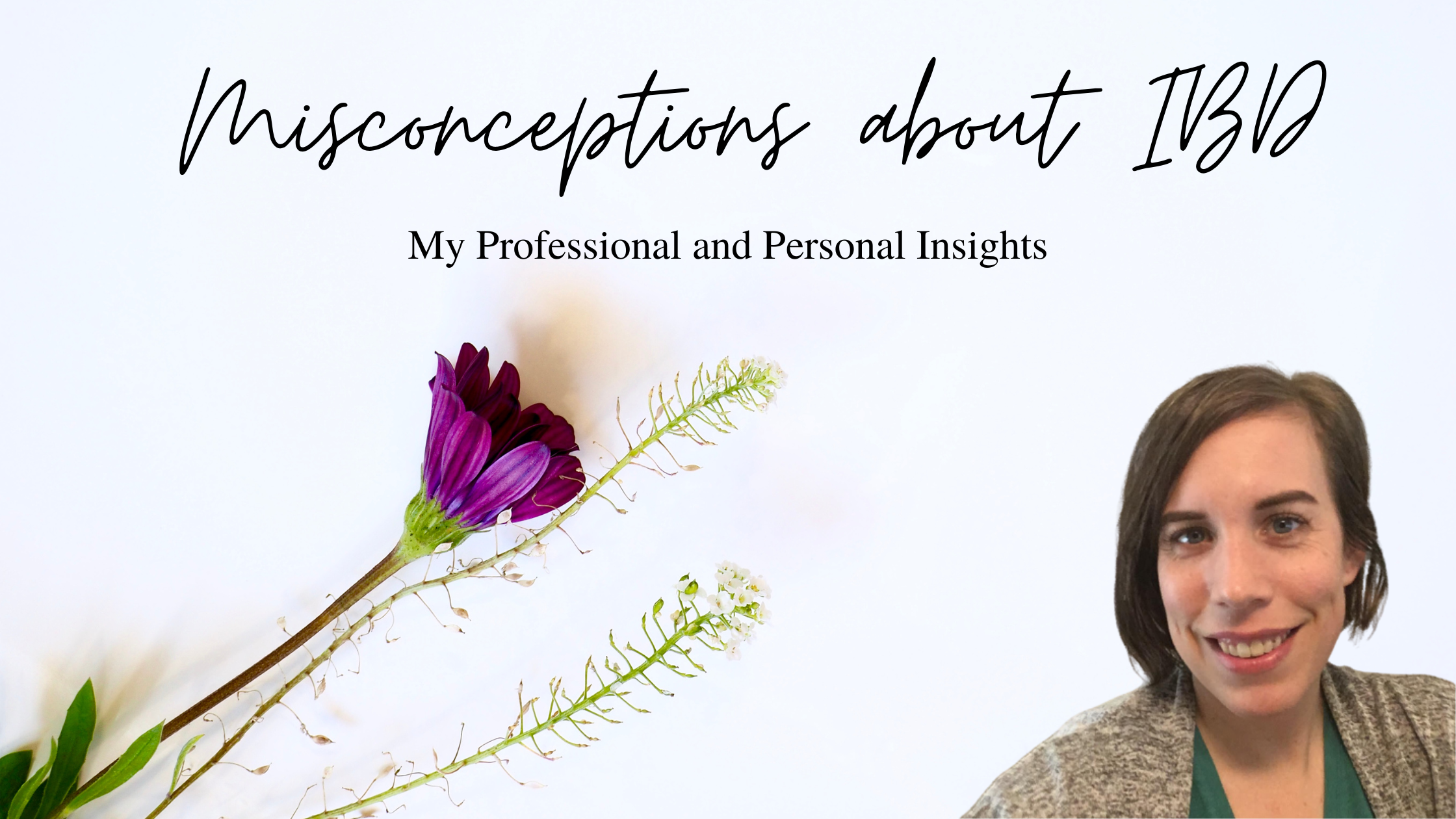Hi everyone!
I’m Ashley Hurst- a Registered Dietitian who specializes in providing nutritional support and guidance to those living with Irritable Bowel Diseases (IBD) such as Crohn’s and Colitis.
I was diagnosed with Ulcerative Colitis in 2011 and, despite my nutrition background, often felt as lost as many of you may feel right now.
And while I appreciated the support available online, I also quickly realized that much of the advice given via certain groups skewed too heavily towards anecdotal evidence and perhaps not strongly enough towards the science.
I also realized that so many misconceptions about IBD are perpetuated both online and via actual experiences in the healthcare system.
These issues are exactly why I do what I do today as a dietitian.
I know that the combination of my expertise and personal experience grants me a unique perspective when working with clients, it – allowing me to discuss these challenging conditions from both the personal and professional standpoint.
I truly understand just how universal our IBD experiences are.
Which is what brings us to the content of today’s article.
I know that so many people living with IBD are bogged down by the same misinformation and misconceptions that both myself and my clients have been exposed to.
Misconceptions such as;
- What we eat doesn’t impact our IBD
- Food choices are the ONLY thing that impacts IBD
- Lifestyle (stress & sleep) doesn’t impact our IBD
If you’d like to know more about my professional and personal experience with these misconceptions- read on below!
Misconception #1 Your Food Choices Don’t Affect Your IBD
What I know as a professional: While what you eat doesn’t cure your IBD and eating habits aren’t the single cause of IBD, the idea that nutrition has no role to play is very misleading.
Oftentimes, IBD patients that inquire about getting nutrition support are told by their doctors that nutrition and eating habits make no difference in their health – which frankly isn’t true and doesn’t align with the current evidence that is supportive of an evidence based nutrition protocol in helping Crohn’s and Colitis patients get to remission sooner and stay there longer.
This way of thinking also devalues medical nutrition therapy for IBD and could mistakenly lead patients down a path that may worsen their IBD.
We know, for example, that fast food intake several times per week leads to a 390% increased risk of developing IBD and causing a flare.
We also know enough about IBD and the gut microbiome to know there are some diet styles that increase the likelihood of a flare and other styles that improve gut health and help support remission.
Most people also forget- nutrition is not just about what you eat. It’s also about checking for and treating deficiencies that may be a roadblock to getting to remission.
Nutrition interventions may also include adjusting the diet or supplementation to help with coping with flares or symptoms.
While I try to stay up to date on the latest IBD research, I also know that in general many of things won’t make it into mainstream approaches for another decade. But that’s ok. As someone with a very full practice I know that IBD patients know better than to think nutrition has no value.
And I hope to be providing resources for those of you that are interested for years to come.
What I experienced personally:
When my doctor first belittled the role of nutrition in IBD management I felt devastated and confused as I had just spent over 8 years studying nutrition where we learned medical nutrition therapy for disease states- including for Crohn’s and Colitis.
I mean should I just throw my degree in the trash?! Yet I was seeing first hand how minimized nutrition support is- even in health care.
Yet I also felt personally that it didn’t make any sense.
I thought- so you are telling me what goes through the digestive tract doesn’t impact it at all? I knew there was more and I listened to my “gut feeling” which I have never regretted.
Misconception #2 – Your Food Choices Are the ONLY Thing That Affect IBD
What I know as a professional: I see many people restricting way too much on a regular basis.
They have popcorn, notice symptoms, ok no more popcorn.
They have blueberries, notice symptoms- no more blueberries.
This cycle goes on repeat until they are left with only five items they can consume. The problem is, this type of restriction does more harm than good.
Too much restriction starves off helpful gut microbes and will also add to the fatigue you are already feeling.
What I teach my patients is to first understand how to distinguish between inflammation/flares and irritation type symptoms.
Many people aren’t taught with diagnosis that there are different types of remission. There is clinical remission which you can detect when there is no signs of inflammation. The best way to verify clinical remission is with lab work.
However, you can still have irritation type symptoms like diarrhea, constipation, bloating and more when you are in clinical remission.
In fact, almost half of those with IBD have irritation type symptoms or IBS. In my practice, I’ve found personally that the number is probably much higher than that.
Symptoms alone can be misleading and shouldn’t dictate what you should or shouldn’t eat all the time. Working with a professional (like myself) can help make clear what the true IBD triggers are, how to adjust and minimize symptoms and more.
What I experienced personally: When I was first diagnosed, I didn’t know what to do.
Like many of you, I felt restricted for a long time because I did not yet have a proper means to understand what was working and what wasn’t.
If this sounds like you, don’t worry – I understand.
Misconception #3 – Stress and getting enough rest don’t impact your IBD
What I know as a professional: We know prolonged stress triples your risk of flare.
Not sleeping well and excessive high intensity workouts can also impact our perceived stress levels.
We also know vitamin D levels greatly impact treatment success.
In fact, vitamin D in recent years has been suggested to be a treatment approach for IBD regardless of whether deficient or not. In cases that it’s low it’s been shown to cut fecal calprotectin (marker of intestinal inflammation) in half!
That’s incredible for something that’s relatively low cost to test and treat.
But vitamin D and stress just scratches the surface of things we know that can impact IBD. All of that to say, if your current plan isn’t working for you make sure to consider all the variables.
What I experienced personally: In my doctors office I saw a poster sized chart once that had IBD on one side and IBS on the other.
The idea of the chart was to distinguish the differences between the two. On the side of IBS it said- stress can intensify symptoms.
On the other side for IBD it said- stress has no impact. Maybe the poster was from the 80’s- I don’t know but it seems outdated with what we know now.
I wish I would have known then what I know now as I would have done much more to support myself from the stress management perspective.
Conclusion
I hope today’s post was refreshing and offered you some additional insight into your experience living with IBD and the opportunities available for you to take management more strongly into your own hands.
If you don’t have a nutrition plan yet, or are curious as to what’s possible for you please reach out. I’d love to chat with you.
I have several options for people- both for those ready to get started with a solidified plan and for those just looking to learn!




Is there a good plant based multivitamin that you reccomend for someone with ulcerative colitis constipation dominant?
We like the ones on our website but multivitamins aren’t all that effective when it comes to immediate relief from constipation. I’d suggest looking into our product gut love instead- it’s an awesome prebiotic regulating fiber- meaning it has lots of evidence for both building up both gut flora and regulating bowel movements. If you’d like to read more of the research you can go to http://www.gutlove.us
I would love to hear you diet recommendation since i also believe that what you put in you guts affects your disease.
Hi Jehanne! Thanks for the kind words. I actually have a lot of information in my course about this topic! That’s my favorite resource for people since it answers a lot of the questions that come up around dietary/supplement approaches. I’m happy to discuss in a call too if you’d like. 🙂